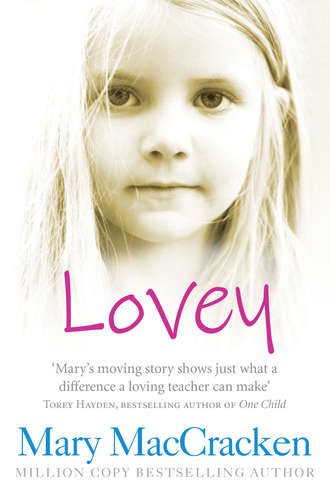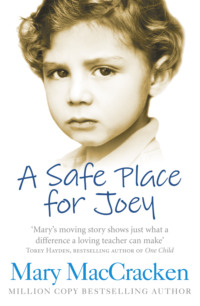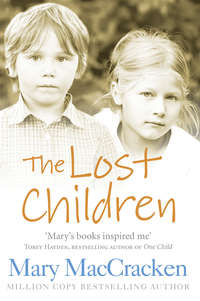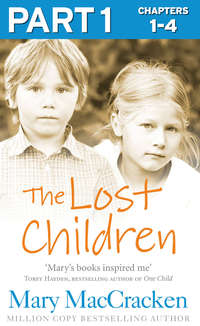
Полная версия
Lovey
I had telephoned Mrs Rosnic at the end of that first day to ask if she could come in for a conference. Although she was hesitant and it had taken two weeks, she was here and I was grateful. Helping Hannah was not going to be easy. She was going to have to give up old established ways and learn new ones. There were difficult weeks ahead, and before I initiated any major changes at school I wanted to talk to Hannah’s mother and learn what Hannah was like at home. I needed to fill in the gaps left by the psychological reports, to find out what sort of relationship there was between Hannah and her brother and sister, between Hannah and her mother. Our school day was only five and a half hours long. There were eighteen and a half other hours I wanted to know about.
I had been sitting at one of the low tables, but as Mrs Rosnic hesitated in the doorway I got up and walked towards her. ‘Please come in.’
But she remained where she was, her eyes moving rapidly around the room. By now the boys’ papers and drawings covered one wall. We had begun a large mural on another, but the only sign of Hannah was her name on her cubby and above the coat hook in the closet.
‘May I take your coat?’ I asked.
For the first time Mrs Rosnic looked directly at me and it was my turn to stop, startled by the fear in her eyes.
As gently as I could, I took her coat and hung it in the closet beside my own light sweater, and then, impulsively, I moved them both so that they hung together on Hannah’s own hook. I came back and sat down at the round wooden table. ‘Thank you for coming in,’ I said. ‘I know how difficult it must be for you to get away with the three children at home, but I wanted to talk to you a little bit about Hannah. I’m happy to have her in my class this year.’
Mrs Rosnic came across the room then, stopping in front of me. ‘You not getting rid of her?’
So that was the fear; it was still there in her chopped, guttural speech. There were traces of an accent. I must remember to check and see what language was spoken in the home. It was possible that much of Hannah’s garbled speech was a poor imitation of the words she heard exchanged between her mother and grandfather. But that could come later.
Now I had to get through that fear, let Mrs Rosnic know that I didn’t want to get rid of Hannah. On the contrary, what I wanted was to get closer, know more. The best way I knew was to say it simply and straight.
‘I won’t get rid of Hannah,’ I promised. ‘She’ll be here in this class all year.’
Mrs Rosnic sat down opposite me then, her eyes never leaving my face. ‘In other school, every time they call me for conference, they warn Hannah is too bad. They say she have to go.’
‘Not here. When I call you, it’s because I want to know more, try to figure out how to help more.’
Mrs Rosnic drew in her breath and then let it out in a long, slow sigh, but as her body relaxed, more of her weariness showed. ‘Ah, she is so hard, that one. I don’t know what to do with her. Yelling, screaming half the time. Most other time she just sits, dumb, do nothing. Once in while she play joke. Put mouse in Grandpa’s bed and laugh and laugh when he yell.’
I tried to picture the house. I knew Grandpa lived downstairs, but where would Hannah get a mouse?
‘A real mouse?’ I asked.
‘Lots of mice around. They’re not trouble. Hannah like them. The cats are good, get rid of most of mice. Only if rats come, then the cats scared.’
‘Mrs Rosnic, Hannah doesn’t talk to us here at school. Does she talk at home?’
‘She not talk Carl or Grandpa, but sometime she talk to me. Say yes, no, other words. Grandpa say she not make sense, but I know what she mean.’
It was hard to tell from this whether Hannah spoke more or whether Mrs Rosnic’s interpretations were better.
‘Listen,’ I said, ‘what’s Hannah like in other ways at home? I know she goes to the bathroom by herself. Does she wash, brush her teeth and dress herself?’
‘No.’ Mrs Rosnic’s sighs were deep now. ‘She never wash. She sleep in dress all night. Won’t get out of it. Next morning Carl or Grandpa hold her and I get other dress on her.’
‘Carl. Does Hannah play with him or with her sister?’
‘Play? Nobody play. Just fight, fight, fight. At each other day and night. Carl tease her all the time. Now he tell her she going to retard school and she cry and cry.’
I felt like crying myself. Poverty, dirt, ridicule. I looked away for a minute, trying to clear my mind, to see what to do next. I turned back to Mrs Rosnic. ‘What about friends? Does Hannah play with other children on the block?’
Mrs Rosnic sat up straight, definite now. ‘I careful with her. Keep her in back yard so neighbour kids not make fun. Sometime when I fixing Grandpa’s food she get away, but not much. Mostly I keep her near.’ A wistful look came over Mrs Rosnic’s face. ‘Sometime I wish … I think how good if she could help some. You know. Like set table. Maybe even dry dishes.’
I reached across the table. If she had been a child I would have touched her then, but instead I touched the water glass of the roses and left my hand out open on the table.
‘I know I wish too much,’ she continued. ‘Should be glad she not worse. Grandpa say she can’t be worse, say she better dead from operation. But I don’t know. It nice, kind of, you know – to have somebody like me.’
My heart ached and angered all at the same time, even more than when I’d read the reports. No wonder this good, uneducated woman was close to giving up. Under the weariness and despair had once been mere laughter and other dreams? It was too late now to recover those dreams; too late for Grandpa and maybe for Mrs Rosnic. But not for Hannah. Maybe I couldn’t do anything about the poverty or the loneliness, or Carl or baby Helen, but I could help Hannah. And so could Mrs Rosnic.
‘Listen,’ I said. ‘You’re not expecting too much at all. You’re exactly right. Hannah should be learning to help you around the house. She can learn to do all those things. And more. Much more.’
Mrs Rosnic looked at me and then fished in her large black pocketbook for a handkerchief. I got up and brought back a box of Kleenex from the counter and set it down hard on the table.
‘Hannah can learn to wash and dress herself and help you with the housework. And she can learn to read and write.’
This was too much. I had gone too far. Mrs Rosnic shook her head at me. ‘No,’ she said. ‘You don’t know. Grandpa say she moron.’
‘I do know and Grandpa’s wrong,’ I insisted. ‘I have known other children as troubled as Hannah. I have read her records and I have watched her here in the classroom. I don’t believe she’s retarded. I believe she’s able to learn and grow and do a great deal more than she ever has.’
Mrs Rosnic looked at me directly, challenging. ‘Why you care? Why you want to do this?’
It was a fair, honest question and I wished that I could answer. But I had never been able to find words for the way I felt. I could talk easily about the children, or to the children, but when it came to describing my own feelings, I was inarticulate. Perhaps the words imprisoned in the children spoke to something locked inside me. I tried to soften my silence with a smile so that it wouldn’t seem a rebuff. ‘I don’t know,’ I answered as honestly as I could. ‘I wish I could put it into words. I can’t explain, but I hope you’ll trust me.’
I went to the coat closet and got Mrs Rosnic’s coat and my sweater from Hannah’s hook and then held the coat for her. Mrs Rosnic stood facing me, still looking at me. Finally she turned and put one arm into a sleeve. ‘Ah, well, never mind. Words come hard. I know. And anyway, the ones that say them so easy – well, I hear plenty words before.’ She put the second arm in.
‘It’s not going to be easy with Hannah,’ I said. ‘That’s one thing for sure. It’s going to mean a lot of work for both of us, and it will be harder for you because you’re with her more. Sometimes you’re going to have to be very strong. Hannah’s been used to having her own way, and she’s not going to be able to all the time now. She won’t like it, and sometimes she’s going to get very angry with both of us.’
I shrugged on my sweater and then was caught by surprise as Mrs Rosnic reached out and smoothed it across my shoulders. Her fingers were rough and they snagged on the soft wool, but her hand itself was strong and warm. ‘Listen. It okay. I tell Grandpa. It okay. Hannah, she lucky this year.’
Chapter 5
The next morning after Circle I went and sat on the floor in the closet next to Hannah. The period of research was over. I had learned all I could from outside sources. Now it was up to me. I set my goals for Hannah. They might change, but I had to have something to aim for.
The first thing I had to do was get Hannah out of the coat closet. Observation has its values, but it was time for her to move closer, become part of us. ‘Listen,’ I said, ‘I want you to come and sit with us during Best and Worst today. You don’t have to talk, but I want you at the table. You’re part of our class and I want you with us.’
Hannah pulled her long dress over her head.
I pulled the dress down and spoke directly into her face. ‘If you can come by yourself, fine. If not, I’ll help you.’
I wanted her to understand that this was not a question of choice. She didn’t have to decide anything. I had made the decision. She had sat in the closet for two weeks. That was long enough.
I hesitated for a minute. The trick was to know when to ask for more and when to stop. Each step like this was a risk, the line between success and failure is so small. I had thought carefully about when and where to begin with Hannah, and now I decided to go ahead. This was the time, right after Circle. She was fascinated by Best and Worst. I had seen her looking, listening, from the closet. And contradictory though it seems, I knew that the first move is sometimes easier if someone else insists on it. I insisted now. I stood up. ‘Okay, Hannah, let’s go.’
She pulled the dress back over her head.
I reached under the dress, found her hand, and pulled her to her feet. Caught by surprise, she came up easily but let out a howl of rage.
‘This morning you’re going to sit with us. This morning and every other morning from now on. You’re part of our class.’
Standing beside me, Hannah braced her feet like a baulky mule and pulled hard to get away.
The classroom was large, over forty feet long. The boys had set up the table in the middle of the room and they sat there now, watching us. We had about twenty feet to go to reach the table. I was sure I could manage that. Hannah was husky, but I had a lot of inches, pounds, and years in my favour and my will was as strong as her own.
‘If you can control yourself, Hannah, great. If not, I’ll help you control yourself.’
I started walking towards the table, holding her hand tightly in my own and propelling her along with me.
Her howling ceased. She planted both feet close together again and braked us to a stop and smashed her foot – crack! – into my ankle. I yelped in surprise, but I caught her foot in time and pulled off first one shoe and then the other. She could kick all she wanted now.
I had been through this many times before. Other children in other years had kicked and bitten, but they had become more gentle. We had all survived, and eventually they had made it back to mainstream school.
The howling began again, but there was little she could do, and more in sorrow than in anger Hannah allowed herself to be pulled to the table.
‘Get another chair, please, Bri.’
I sat Hannah down next to me and said to the boys, ‘Whose turn is it to begin Best and Worst today?’
My eyes, my attention, were focused on the boys. I kept a steady grip on Hannah’s hand, but that was all. Except for this hold on her hand, we ignored her. She alternately cried and yelled for the half hour. She was loud, but we were louder and managed to hear each other.
At the end of the half hour, the boys went to get their work folders from their cupboards. I looked down at Hannah’s tear-stained face, ‘Thank you, babe, for being with us.’ Then I released her hand.
For one brief moment she looked at me and then raced back to her closet seat. Her scuffed brown shoes still lay on the floor. I took them to her and then went back to help the boys with their reading. All the rest of the morning she sat merely watching us, not saying anything, not yelling, just sitting there holding her shoes in her lap.
At the end of the morning I sent the boys out for recess with another class. The tension in the room had been hard on them, though none of them had mentioned it and they had worked well all morning. Still, they needed to get outside to run, to throw, to yell a little. At the same time I didn’t want to leave Hannah. It was important that she knew that I wanted to be with her. There is a great difference between someone arbitrarily imposing demands on you and someone working through a difficult situation with you. I wanted Hannah to know that, whatever I asked of her, she wouldn’t have to do it alone.
I needed something more, something to hook her interest, make her forget herself. I wanted to capture Hannah, lure her, not force her again. Suddenly I remembered the doll family.
I had ordered the dolls from the school supply catalogue the year before and stored them in my closet, waiting for the right time to bring them out. Surely, if there was a right time, this was it.
The next morning, after Circle, I announced that we were going to add something new to Best and Worst. I placed the box in the middle of the table. In the closet I said to Hannah, ‘Hey, come see. I’ve got a box for you to open.’
She peeked out of the closet to see what I was talking about. The box sat invitingly on the table. Hannah couldn’t resist it. She skirted the table twice on her own and then suddenly sat down and peeled off the tape and pulled the box open. She lifted out the brown crumpled packing paper and sat staring at the contents. Then, one by one, she lifted out the members of the miniature family, unwrapping each one carefully and laying it on the table. Man, woman, girl, boy, baby.
The dolls were made of a hard, wax-like substance, a kind of moulded rubber, pliable, durable, sturdy enough to take bending and pounding.
We all sat looking at the dolls. No one seemed sure what to do next. On impulse, I picked up the woman and girl dolls and put their arms around each other. ‘My best thing is that Elizabeth, my daughter, came home from college for a visit last night.’
I talked for about two minutes, telling how my daughter and I had gone to a movie and bought some ice cream. As I talked I was bending the dolls to sit, pushing them along the table, pretending they were moving in the car.
The children watched, their eyes never moving from the little figures. When I finished I laid the two dolls back on the table.
Rufus was sitting next to me, and he picked up the man doll and in a loud, authoritarian voice said, ‘If I’m doing the cooking, I’ll do it the way I want to. So shut up!’
We all stared at him. None of us had ever heard Rufus speak like that before. Obviously he was being someone else.
Now he picked up the woman doll and in a high, wistful voice said, ‘You never listen to me, no matter what it is. Cooking or anything else.’
Maybe not, but we listened to Rufus. Forgetting time limits, we sat spellbound as he acted out a household drama, using first one doll and then another. When he finished he pushed the dolls to the middle of the table and leaned back with a tired, satisfied sigh.
Jamie picked up each doll and inspected it carefully. He petted the baby and kissed the mother and then put them back without saying a word.
Brian had his turn and acted out a TV commercial.
And now, look at Hannah. She picked up the boy doll and put him under the box. She pushed hard on the box, which wobbled in an unsatisfactory way. She got up from the table, went to the block wagon, and pulled it back to the table. What was she doing? She laid out one, two, three, four blocks in a square and put the boy doll in the middle. Was he supposed to be her brother, Carl? Bang, she put a block on the top, then another and another.
Hannah looked up at us and smiled. For the first time in our room she smiled with pure joy, as she added block after block on top of the boy doll.
Chapter 6
Hannah came to Best and Worst each day, but she still ate in the closet. She brought her lunch in a crumpled brown paper bag and tucked it safely behind her coat every morning. Then, all day, she ate whenever she was hungry, sitting on the floor in the closet.
She ate like an animal, tearing at the food with her teeth, no matter how soft it might be. She aimed for the centre of the cupcake, trying for the choicest morsel, eyes glancing right and left, on the lookout even while she ate. Once she had made contact with the food, her fingers rapidly prodded as much as possible into her mouth. Then, when she couldn’t fit any more in, she clamped her teeth together, cutting off the rest. The crust, the cheese, the jelly, the crumbs, fell to her lap or the floor. But even these she guarded carefully and ate when she felt hungry again.
It was a sad and terrible way to eat. I’d let it continue in those beginning weeks because I had to get to know Hannah. I watched, listened, learned her behaviour. I couldn’t begin to teach until I knew where to start.
I knew Hannah now, not intimately yet, but enough to realise that it was worth the long struggle ahead. The intellect, the curiosity, the potential were there and so was the motivation. Food was extremely important to her. In the area of food, I would have Hannah’s complete attention.
I waited one more week; then I stopped Hannah as she arrived and quickly, before she could react, took the paper lunch bag out of her hands. I placed it in full view but high above her head, on the closet shelf.
As I took her lunch bag away Hannah drew back, mobilised for action. She raced for the closet, jumping, leaping, trying to reach the paper bag that I’d put on the shelf. But this lasted only a few seconds. Almost immediately she ran back to get a chair. Inwardly, I exulted at her reaction, her immediate understanding of the problem, her swift attempt at a new solution. Outwardly, I took the chair away and said, ‘Not today, Hannah. Today you’re going to eat with us.’
Fury exploded in our room. She understood what I said and she was not about to let it happen. She ran for another chair, and another, and another, and another, as I blocked her attempt. Finally frustration and anger caught up and she went down on the floor in the knee-chest position of the first day. Once again she drove her head down towards the hard tile floor, howling all the while.
I sat down beside her. ‘Hannah. Nobody’s going to take your lunch. It’s yours. I’m going to keep it for you on the shelf until lunchtime. We eat lunch at twelve. Look, see the clock? When both hands are up at the top, we’ll eat.’
Again she couldn’t resist. The rocking stopped and for a second she allowed herself one swift look at the clock above the door. She understood me; she had receptive language, and she knew what a clock was!
But the pause was only for an instant. Back to the rocking. And it was only nine thirty. I couldn’t keep taking chairs away all morning. What to do for two and a half hours, with three other children to teach?
I sat beside Hannah, thinking, looking around the room. Finally I spotted a pipe running along the ceiling inside the closet. There might be just enough room to prop her lunch there. It would still be visible, in plain sight, so she would know it was safe, but there was no chair in the room high enough to let Hannah reach it.
I got up and moved the lunch bag. By standing on a chair I could just reach the pipe, and I wedged Hannah’s lunch behind it. She grabbed a chair and ran with it to the closet, but the chair was no help this time; I was a good foot and a half taller than Hannah. As soon as she realised this, she pushed the chair over and came after me. Yelling, screaming, her hands clawed at me.
I put my arms around her and held her from behind. ‘Hannah, Hannah. You are so foolish. All this fuss about your lunch. Nobody will take it, I promise you. Nobody can get it, except me, and I’ll give it to you at lunchtime. Twelve o’clock, when both hands are at the top of the clock. You watch. You’ll see.’ Hannah broke away from me and ran back to the chairs.
Brian and Rufus were both trying to work, but their eyes never left Hannah for long. Finally Rufus took his book and lay it in a spot on the floor just behind the free-standing bookcases.
He read out loud, talking to himself at the end of each line. ‘Don’t worry, Rufus, that ol’ dummy girl will go home soon’ – or sometimes just ‘It’s all right. Don’t be scared, Rufus.’ It’s not surprising that he barely finished a page.
Brian had even more difficulty handling the situation. He abandoned his book altogether and went back to his old-time pacing of perimeters. He no longer ran or croaked out strangled cries, nor did his arms flap wildly, as they had when he had first come to school. Now he walked silently around the edges of our room and only his fingertips trembled against his sides.
But Jamie couldn’t stand it. His own need for security was so desperate, his ability to cope with feelings so minimal, that when Hannah exploded he replied in kind. As she pushed chairs over in the back of the room, he pushed them against the side walls, grabbing one and pounding it up and down.
But as the minutes dragged on Hannah quieted a little and Jamie calmed too. I crouched down beside him and gathered him up, holding him close, murmuring against his neck, ‘Jamie, Jamie, I’m sorry. I know it’s hard. Now just hang in, okay? Just stay with us. It’ll get better. This is the worst. It will be better.’
I knew he really didn’t understand all I said, but it didn’t matter. Our language depended more on tones and touch than words. I needed to know that he wouldn’t revert back to the desperate runaway of the year before, circling the church and dashing towards the highway. Jamie needed to know that the strange noisy girl had not usurped his place.
This was Jamie’s second year with me. He had been at the school for two years and had spent most of his first year running, with his young, bewildered teacher always just a little too far behind. Then he’d been assigned to me. I suspected that Jamie was mentally challenged, at least to some degree. While the school was designed for seriously emotionally disturbed children, it is often difficult to distinguish between autism and mental disability. When a child doesn’t respond, it is sometimes hard to tell whether this is because he refuses or is unable.
With Jamie, it was possible that autism and disability were both present or that, as some professionals think, the two are intertwined. In any event, I asked for what I thought he was capable of doing and rejoiced in his small successes.
I sighed as I held Jamie, listening to Rufus muttering behind me, watching Brian pause at the chalkboard and nervously begin to draw the panel of stars from the telethon of the night before. So much time was being lost, time I needed to keep Jamie steady, let Rufus grow, help Brian make it to public school. And yet there was no other way. Hannah had to become part of us, had to find her own place within the accepted limits of the class. It was up to me as teacher to somehow get her there.
I looked at Hannah over the top of Jamie’s head. She was still in the closet, trying to balance one chair on top of another. At least she was off the floor working on the problem. I turned back to Jamie as he wiggled around in my lap and put his hands across my eyes. Close relationships have their own rituals, and I knew what to say. ‘Where are you, Jamie? Where’d you go? I can’t see you any place.’ Down came his hands. ‘Oh, there you are! Boy, am I glad to see you!’ And the fact that he nuzzled in close announced the success of our old foolish game.






